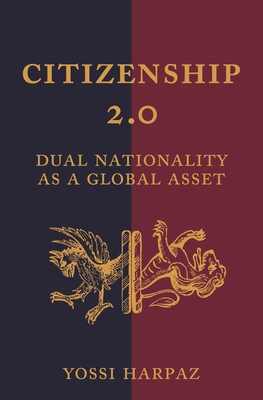

 Princeton University Press
Princeton University Press
Citizenship 2.0: Dual Nationality as a Global Asset


Key Metrics
- Yossi Harpaz
- Princeton University Press
- Paperback
- 9780691194066
- 9.2 X 6 X 0.8 inches
- 0.8 pounds
- Political Science > Civics & Citizenship
- English
 Secure Transaction
Secure TransactionBook Description
Citizenship 2.0 focuses on an important yet overlooked dimension of globalization: the steady rise in the legitimacy and prevalence of dual citizenship. Demand for dual citizenship is particularly high in Latin America and Eastern Europe, where more than three million people have obtained a second citizenship from EU countries or the United States. Most citizenship seekers acquire EU citizenship by drawing on their ancestry or ethnic origin; others secure U.S. citizenship for their children by strategically planning their place of birth. Their aim is to gain a second, compensatory citizenship that would provide superior travel freedom, broader opportunities, an insurance policy, and even a status symbol.
Drawing on extensive interviews and fieldwork, Yossi Harpaz analyzes three cases: Israelis who acquire citizenship from European-origin countries such as Germany or Poland; Hungarian-speaking citizens of Serbia who obtain a second citizenship from Hungary (and, through it, EU citizenship); and Mexicans who give birth in the United States to secure American citizenship for their children. Harpaz reveals the growth of instrumental attitudes toward citizenship: individuals worldwide increasingly view nationality as rank within a global hierarchy rather than as a sanctified symbol of a unique national identity.
Citizenship 2.0 sheds light on a fascinating phenomenon that is expected to have a growing impact on national identity, immigration, and economic inequality.
Author Bio
I am Assistant Professor of Sociology at Tel-Aviv University. My research examines the impact of globalization on national identity and citizenship. I received a Ph.D. in Sociology from Princeton University. In 2019-2020, I was a postdoctoral fellow at Harvard University's Weatherhead Center.
One longstanding project analyzes the consequences of the permissive shift in states' relation to dual citizenship. Other projects I am currently working on examine related questions, including: What drives the acquisition of investor visas by millionaires in developing countries? Do people equate international travel with high social status? Are citizenship and national identity coming to be viewed in an instrumental manner, and what measures do states employ to make them more sacred?
My book, Citizenship 2.0: Dual Nationality as a Global Asset (Princeton University Press), came out in 2019. The book analyzes and compares the dynamics of dual citizenship in three cases: EU citizenship in Israel, Hungarian citizenship in Serbia and U.S. dual nationality in Mexico. The book sheds light on the global trend of strategic citizenship, and explores its implications for ethnic and national identities, immigration and inequality.
Source: www.yossiharpaz.org
Videos
No Videos
Community reviews
Write a ReviewNo Community reviews